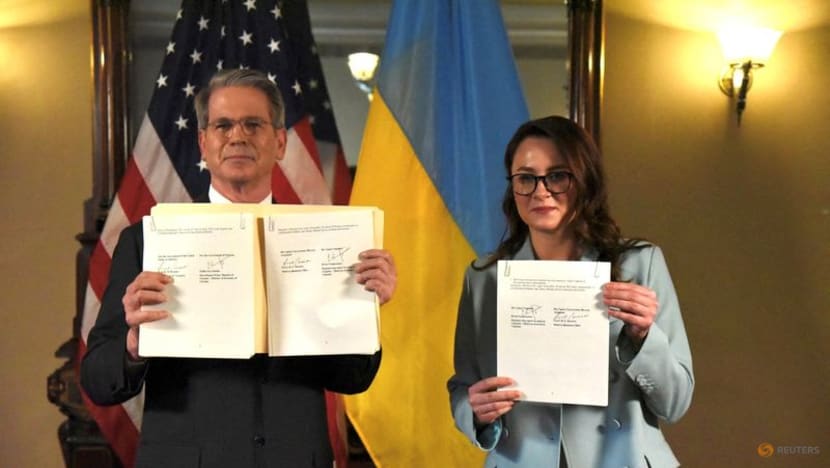Commentary: Zelenskyy has pulled off a tactical win for Ukraine in US minerals deal
The minerals deal is a far cry from what US President Donald Trump originally wanted, but it sends a clear signal to Russia, says international security professor Stefan Wolff.

US Treasury Secretary Scott Bessent and Ukrainian First Deputy Prime Minister Yulia Svyrydenko pose after signing a deal that will give the US preferential access to new Ukrainian minerals deals and fund investment in Ukraine's reconstruction, in Washington, DC on Apr 30, 2025. (Photo: Reuters)

This audio is generated by an AI tool.
BIRMINGHAM: After months of tense negotiations and a disastrous Oval Office clash, a 15-minute heart-to-heart before Pope Francis’ funeral seemed to have done the trick. The United States and Ukraine finally signed the long-awaited minerals deal on Apr 30.
The fact that Washington and Kyiv managed to agree on final terms – despite last-minute uncertainties – is in itself remarkable. Unusually, the US took an unequivocal stance regarding Russian responsibility, considering President Donald Trump blamed Ukraine for starting the war as recently as Apr 14.
The agreement establishes a United States-Ukraine Reconstruction Investment Fund “for the long-term reconstruction and modernisation of Ukraine, in response to the large-scale destruction caused by Russia's full-scale invasion of Ukraine and in pursuit of a peaceful, sovereign, and resilient Ukraine”.
A statement released by the US Treasury after the conclusion of the deal went a step further, noting that the agreement “signals clearly to Russia” that the Trump administration is “committed to a peace process centred on a free, sovereign, and prosperous Ukraine over the long term”.
A WIN FOR UKRAINE
After the very public falling-out between Volodymyr Zelenskyy and Mr Trump at the White House on Feb 28, it looked like the Ukrainian president had gambled away his country’s future. Somehow, he has eked out a win.
Ukraine managed to exclude from the agreement any recognition of past US assistance as part of Washington’s contribution to the fund. Mr Trump initially saw this as a way to make Ukraine reimburse US$500 billion in mineral wealth – around four times what the US had provided since the start of Russia’s full-scale invasion in February 2022. Instead, only future military assistance will count as US contribution toward the fund.
Ukraine will also maintain ownership over its natural resources. The agreement does not give Ukraine’s minerals to the US, but includes a provision for the US to purchase future mineral resources.
Ultimately, Mr Zelenskyy has ensured continued US commitment not just in the war, but to a post-war future.
WHAT CHANGED DONALD TRUMP’S MIND?
What changed most in the past months seems to be Mr Trump’s calculus about how he can live up to his campaign promise – and most likely sincerely held belief – that he will and must end the war against Ukraine.
No matter how significant American concessions appeared to be, Russian President Vladimir Putin refused to agree even to a ceasefire. And his foreign minister, Sergey Lavrov, reiterated Russia’s insistence on its maximalist demands for a peace agreement, including the full international recognition of all illegally annexed Ukrainian territories.
After meeting Mr Zelenskyy in the Vatican, Mr Trump now seems to acknowledge that these terms are unacceptable to Ukraine and its European partners and that he needs to increase pressure on Mr Putin to get a deal done.
All of this indicates that Ukraine is now in a much stronger position than it has ever been since Mr Trump returned to the White House for a second term in January.
But this will not necessarily translate imminently into a ceasefire or pave the way towards meaningful negotiations of a peace agreement between Russia and Ukraine.
Mr Putin appears to remain committed to victory in Ukraine. Despite heavy casualties, Russian forces continue to make gains on the battlefield inside Ukraine and have all but eliminated Kyiv’s hold on territory in the Kursk and Belgorod regions inside Russia.
This is unlikely to change unless Mr Trump follows through on his threats of heavier sanctions against Russia and increases military support for Ukraine. There were some signs of the latter, at least, with the White House approving sales of military equipment to Ukraine worth US$50 million shortly after the minerals deal was concluded.
UKRAINE’S REALISM ABOUT AMERICAN SECURITY GUARANTEES
Ukraine’s enthusiasm for the minerals deal is therefore understandable, but may still turn out to be misplaced.
One key demand by Kyiv – that formal US security guarantees be baked into the deal – has clearly not materialised.
There is a certain logic to US Treasury Secretary Scott Bessent’s claim that an economic partnership would “lay the foundations for a durable peace by sending a clear signal to … the government of Russia about the importance of Ukraine’s future sovereignty and success to the US”. But it does not constitute the formal security guarantee required to credibly deter Russia from future aggression.
And without that, a future Ukrainian government might yet again find itself in a situation similar to February 2022 when, despite the presence of many American and European investors in Ukraine, the Western response fell short of putting boots on the ground.
Without a ceasefire in place or a peace agreement on the horizon, insisting on an iron-clad American security guarantee was unlikely to be a winning strategy. And it seems clear now that Mr Zelenskyy realised this just in time, which enabled him to finalise the minerals deal with Mr Trump.
This may not have brought him closer to the just and durable peace that Ukraine and its people deserve, but it has kept Ukraine – and its European allies – in the game for now.
Buying time is a risky strategy for Kyiv when Russia still has momentum behind its campaign on the battlefield – but it might be a winning strategy to let Mr Trump realise that putting pressure on Mr Putin is the key to unlocking the peace deal that has so far eluded him.
Stefan Wolff is Professor of International Security at the University of Birmingham and Head of the Department of Political Science and International Studies.


















